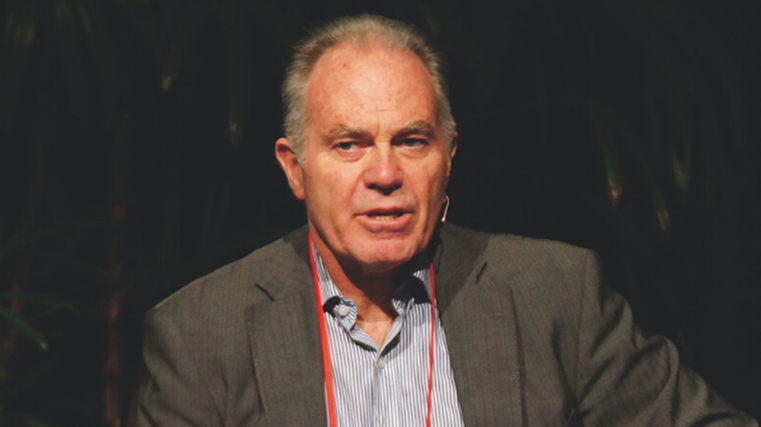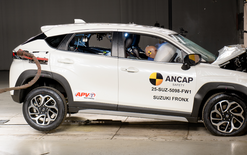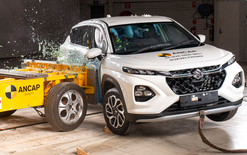Q&A: David Vinsen

VIA’s David Vinsen talks about how the industry has coped with Covid-19 and what issues we should look out for in the future, such as the clean car standard.
Q: What was the biggest challenge for VIA and its members in 2020?
There have been two major challenges we’ve had to deal with.
Internal issues around the restructure of our association have been dealt with extremely well and we’re well-positioned in terms of governance and engaging with key members. We have had a good outcome from a two-year exercise.
The other thing, of course, was coronavirus. We were expecting to have to deal with the final phase of the electronic stability control (ESC) rule and the impact that would have on car volumes, but it turned out to be a small speed bump in the scheme of things because coronavirus disrupted the supply chain and what we could and couldn’t do.
We dealt with Covid-19 by taking a lead role in facilitating workshops between government and industry, and creating working groups.
We convened meetings with key players in each industry sector, along with relevant government departments and their officials.
It was a successful process. We identified potential pinch-points and potential bow waves coming at us and, in turn, could recommend solutions to officials and procedures for the industry to follow.
We acted as a facilitator and conduit. I don’t think we could have done more given the seriousness of the situation and lack of prior knowledge of having to deal with something such as Covid.
VIA and members of the whole industry should pat themselves on the back for the way we handled it.
Q: What other key changes have there been to how the industry now operates?
Internally, the key change was the complete restructure of VIA with new rules, a new board and creation of a council with key stakeholders and separation of responsibilities.
There’s now an elected board of four people responsible for governance and financial issues, and the council holds accountability for the work we do on industry issues.
Externally, the industry has adapted and adjusted extremely well to deal with the requirements of Covid-19 as we have gone through various alert levels. It has bounced back in terms of sales more quickly than we projected.
We were looking at an uncertain future. But after the lockdown, businesses reopened, sales started picking up and uncertainty withered.
It remains unclear whether this was pent-up demand or a genuine increase in demand for sales. We think it’s the latter and sales are moving towards some sense of normality.
Q: How is Covid-19 changing the way your members operate?
VIA represents the whole supply chain, so how Covid has affected businesses depends on where they are in the supply chain.
Auctions in Japan seem to be continuing and border-inspection organisations are located away from major urban areas, so staff don’t have to use public transport. This means they have had fewer restraints in terms of social distancing and lockdowns than might have been expected.
Because vehicle volumes are down, there are fewer ships coming and when they do it’s causing congestion and they sometimes get caught up in the international logistics logjam of all vessels. Ports are having a tough time in adjusting and rescheduling berthages.
Because that sector has been impacted it flows down the line to biosecurity staff in New Zealand, vehicle transport suppliers, compliance centres and onto yards and sales. These sectors are adjusting to what’s in front of them.
Once again, the industry has proved its resilience and entrepreneurial spirit in the way businesses have dealt with these issues, sometimes individually but increasingly together with competitors to get the best ideas and solutions to problems. VIA has been a conduit for helping companies to put together solutions.
Q: What lessons has VIA taken from 2020?
Critically, the lessons we have learnt over the past 32 years have been put into place to allow us to think on our feet and make the necessary adjustments. It’s almost impossible to predict or prepare for these sorts of things just like it was for the stink-bug crisis.
These things are sent to test us and I’m pleased to say the industry hasn’t been found wanting.
The automotive industry has good systems and procedures, and we have people running businesses who are agile enough to make adjustments as we go along.
One lesson we had reinforced in 2020 was that our supply chain, which we have worked on assiduously over the past 32 years to squeeze out inefficiencies, is lean and efficient. By definition, a lean and efficient system has no resilience or buffer in times of a crisis and efficiency is always going to be inversely proportional to resilience.
Q: How would you describe the state of the car industry?
It seems to be heading back to normality and is relatively buoyant and doing much better than anyone predicted.
The economists, who were talking about unemployment, the effect on house prices and the knock-on effect to consumer confidence in a short space of time, have been proven dramatically wrong.
That follows through to our industry. We thought it would be terrible because we depend on the state of the economy and house prices. But we’ve seen a wash of money coming through thanks to low interest rates. That has increased consumer confidence in all sectors and led to buoyant sales.
Q: What are the implications of the increasing push towards low-emissions vehicles?
The implications are huge. We have been talking about this and expecting this since shortly after I started this role in 2004-05. We had preliminary discussions then with the minister and it was obvious that at some stage this was going to be a real issue. Over the years we’ve been moving away from a focus on safety issues because they have been largely dealt with through seatbelts, front-impact protection and the ESC rule. We’ve also looked at health, emissions and fuel economy, which have also largely been dealt with.
The only way to cut the level of greenhouse gases produced by vehicles is to reduce the amount from an individual vehicle or the whole fleet. For the whole fleet, it’s about modal shift, which is getting people out of privately operated and owned vehicles and into public transport, shared transport – ride-sharing, micro-mobility, car-pooling and so on – and active transport, such as walking and cycling.
These changes will impact on urban design – roads, parking and inner-city building use, but equally, urban design will affect the way we use transport. These issues will affect the motor industry.
We’re seeing reduced parking opportunities, increased limitation of vehicles being able to go into city centres, more cycleways and walkways. Those things are part of a master plan to shift people away from privately owned motor vehicles.
The government has chosen to deal only with the fuel efficiency of vehicles entering the fleet of 3.2 million light vehicles, which have an average age of 14 years. We do not feel this is the most effective way. The efficiency and total fuel consumption of vehicles currently on our roads need to be dealt with.
The move to a fuel-economy standard – the so-called “clean car standard” – and the likelihood of a feebate are substantive issues, and the likely impacts are going to be huge and probably sooner than we had been expecting.
The current proposals are likely to severely limit new and used vehicles that come into the country, and we will get a slower turnover of the whole fleet. Vehicles will linger in the fleet longer and issues of fuel economy will be exacerbated.
Having said that, we acknowledge the realpolitik of the situation, which is that New Zealand is a signatory of the Paris climate accord.
As an industry, we’re going to be front and centre for action. Government departments responsible for dealing with our sector will need to work with industry if they are going to achieve the government’s stated targets within timeframes they have set.
It’s likely to have a huge impact on the industry – and the range of vehicles people are able to buy and how they’re able to use them.
Q: What changes, if any, would you like to see in how the industry is regulated?
We have some concerns in terms of parts of the supply chain being self-regulating.
There has been a focus on accredited inspection agencies providing services for the regulators, but we’d like to see controls and regulations for compliance shops, the people who prepare vehicles for inspection and certification. They are largely unregulated, but are an essential component in the compliance process.
It becomes anti-competitive if compliance shops cut corners and put commercial pressure on those players doing it properly. We need the practical and bureaucratic world to deal with this area and give proper accreditation to businesses.
If the government and its agencies had the will to deal with this issue, we could stamp out any problems quickly.
I do not think we’ll go down the path of regulating sales, but deregulation of that part of the industry in 2003 hasn’t necessarily improved consumer protection.
I’ve had discussions and calls from people in the industry who feel that “things were better in the old days” when you had tighter controls and the consumer was better protected. However, they’re not going to roll the clock back to a more regulated regime.
Q: What external support would you like to see for the industry and in what areas?
It’s critical sectors such as ours be fully recognised and funded so they can do their work in a constructive manner, and collaborate and assist government to achieve goals.
We need official recognition and funding, even if it’s on a project or consultation basis.
When stink bugs and Covid came along, the government came to us for assistance to pull things together and make things happen but there was no compensation or funding for those efforts.
We worked with officials but it would be nice to receive some financial assistance, even on a project-by-project basis.
Work around stink bugs we did off our own bat. It would have been helpful if the Ministry for Primary Industries had recognised us and contributed financially to the work we did.
In some industries or sectors where there are no representative bodies, the government struggles with having no one official body to deal with.
VIA is speaking collectively on behalf of the whole industry and its various sectors, making liaison with government easier for everyone.
Q: How do you see things progressing for the industry this year?
I think as we roll into 2021, we’re going to have business as usual initially. But there will be an underlying concern about what will happen from 2022 onwards regarding the fuel-economy standard.
It’s about making hay while we can but remaining aware and concerned about the future, working with the government on solutions that are going to satisfy its requirements but are pragmatic and realistic. That means evidence-based proposals and analysis, which costs money.
We’re in a position of wanting to advocate for the industry and offering professional solutions to any problems. In order to do that, we need recognition and financial assistance.
Q: What trends do you expect to emerge around the supply chain, stock and sales over the coming year?
The supply chain depends on the volume of vehicles coming in. If there are fewer vehicles coming in, then we will have fewer sailings and the shipping lines have to adjust accordingly – limited sailings and even sharing space.
Instead of four or five ships arriving here with vehicles each month, it may now only be two or three.
Systems work best under pressure. When we have pressure of volumes everything works well. When we do not, conversely, we have congestion and peaks and troughs of activity instead of steady flows.
Having said that, logistics operators in each sector of the chain are doing their best to keep that flow going.
I think the effects on the supply chain and efficiency of shipping schedules will turn on volumes coming to the country.
Q: What do you anticipate will be the main challenge for 2021 and further ahead?
I expect business as usual albeit with issues around technology, the environment, Covid or whatever gets thrown at us.
The overarching issue will be work on the fuel-economy standard and feebates, should that rear its head again. We can work with the minister and officials to design and develop an evidenced-based system that’s going to achieve the government’s goals without destroying the industry and severely limiting the public’s choice and forcing up prices dramatically.
We’ll deal with any crises as they come along and we’re working hard on the issues of fuel consumption and greenhouse gases.
Q: What would be your message to members heading into the new year?
To our members, thank you for your support. They should congratulate themselves for having the association in good hands and good shape heading into the future.
To the wider industry, we need to recognise and understand the work that goes on behind the scenes to keep the doors open for used imports, and to ensure they have viable businesses and an opportunity to continue doing what they do.
And to government and officials, we would really appreciate being officially recognised in some form and being able to continue to do collaborative work, while at the same time acknowledging that it comes at a huge cost. Financial support and assistance in that area would be much appreciated.





